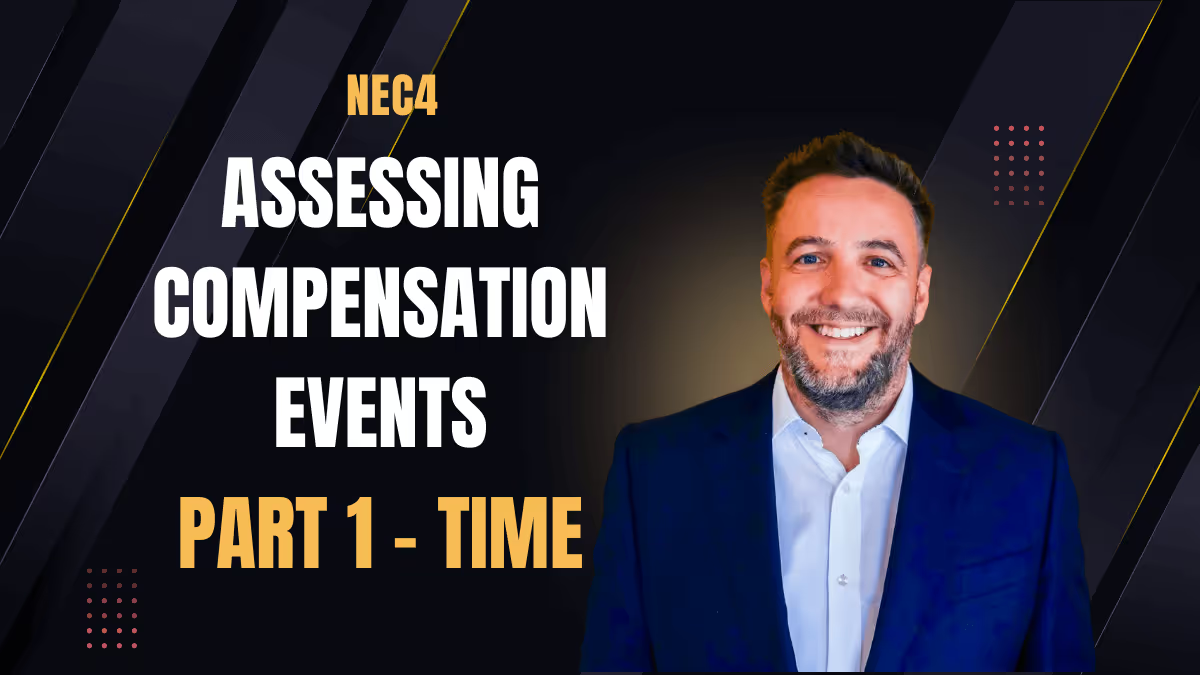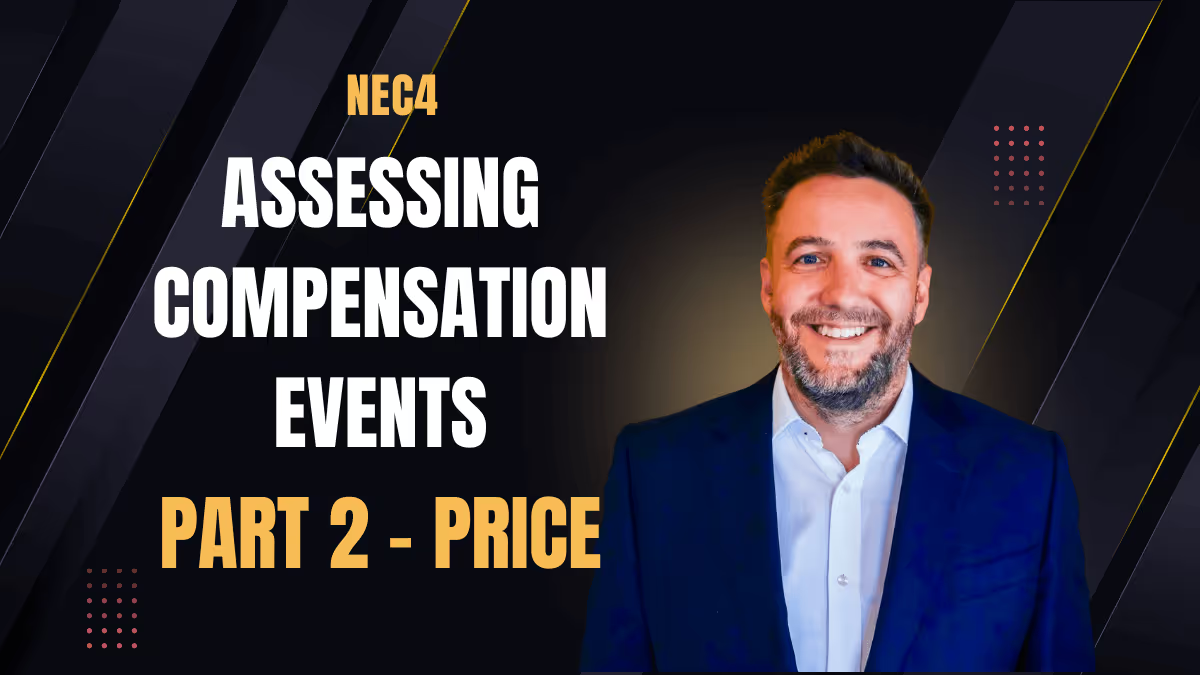00:00 Introduction and Welcome
Ben Walker: Hello and good afternoon—or evening, depending on where you are. I'm in Amsterdam today. Welcome to this third episode of our NEC webinar series. Today we’re looking at assessing compensation events (Part 1 – Time). It’s a big topic, so we’ll cover it in two parts. This first one’s about time, and next month we’ll tackle costs.
David Allen: Thanks, Ben. I’m David Allen from SICA Southern. We represent civil engineering infrastructure organisations across the UK. This series has been great so far, and today we’re digging into one of the trickier areas—understanding how compensation events are assessed under NEC4. Greater clarity means greater certainty for our members.
Glenn Hide: Thanks, David. Great to be back. As Ben said, today’s about the time element of assessing compensation events. We’ll talk through what compensation events are, how time is built into every quotation, the dividing date, and how to avoid the classic mistakes we all see in practice.
04:30 Topic Overview – What Is a Compensation Event?
Ben Walker: A compensation event is something listed in the contract—there are twenty-one main reasons under clause 60.1—that entitles the contractor to adjust prices, the completion date, or key dates, if it wasn’t their fault. Importantly, NEC4 expects prospective assessment—you assess forward-looking impacts, not retrospective ones.
Glenn Hide: Exactly. And that means no global delay claims at the end of the project. You need to capture and price the time effect in each compensation event as it happens.
08:15 Process Recap
Glenn Hide: Previously, we looked at early warnings and notifying events. Today’s step is assessment—how we determine time impacts on the accepted programme. Next month, we’ll finish the loop with implementation.
Ben Walker: Right, and today we’re focusing on the quotation route—how contractors assess time under clause 62 and 63. The project manager’s assessment route can also apply, but our focus is on the contractor’s quotation.
12:00 Key NEC4 Rules – Programme and Assessment
Ben Walker: Clause 62.2 says if a compensation event alters the remaining work, you must show alterations to the accepted programme in your quotation. That doesn’t mean a new programme—it’s the delta between the previous plan and the new reality.
Glenn Hide: And don’t forget—there’s no separate prolongation claim. If you’re twelve weeks late, you need to show which compensation events caused each delay. You can’t roll them up at the end.
17:45 Relationship Between Delay and Defined Cost
Glenn Hide: Time and cost are integrated. You can’t price time separately as prelims. Prelim costs vary depending on the stage of the project—more cabins and people mid-project, fewer at the end. That has to be shown in each compensation quote.
Ben Walker: Right. And if your quote says, “Direct costs now, follow-on costs later,” that’s not NEC-compliant. You must assess the whole effect—both cost and time—prospectively.
22:00 The Dividing Date Explained
Ben Walker: NEC4 introduced the dividing date—it separates actual work from forecast work. It’s not a defined term, but a key concept. It ensures consistency—assessments are fixed at that date and not revised later.
Glenn Hide: Depending on the event, the dividing date could be the instruction date, the notification, or the discovery of a condition. The principle: what’s happened before that date is actual, what’s after is forecast.
Ben Walker: Exactly. That stops the project manager from cherry-picking hindsight. It protects the contractor’s risk allowance.
32:40 Practical Scenarios
Glenn Hide: Take the example of a weather event—you’ll always have some retrospective assessment, because data comes in later. But for design changes or instructions, the assessment is entirely prospective.
Ben Walker: And the dividing date determines which accepted programme you use—the one current at that date, not any newer version. NEC4 made that explicit to stop moving targets.
40:00 Delay Assessment Methodology
Glenn Hide: In NEC4 (2019 update), they clarified that when assessing compensation events, you must take into account progress and other events since the last accepted programme. That’s huge—it solved years of confusion.
Ben Walker: Right. Ignoring progress means you lose entitlement. You must first update the last accepted programme to the dividing date, then add the compensation event to see its true impact.
50:00 Example – Step-by-Step Delay Assessment
Glenn Hide: Imagine your last accepted programme was week six, and now it’s week eight. First, progress it to show actual status. Then, add the CE and reschedule. The delta between the new planned completion and the previous one is your entitlement.
Ben Walker: Perfect. That’s why programme updates and records are the backbone of the NEC process.
56:00 Common Problems and How to Avoid Them
Ben Walker: Big issues we see: outdated programmes, missing planned key date milestones, and not showing time risk allowance. You must show float, key date milestones, and resource levels on your programme.
Glenn Hide: Exactly. And keep records—without contemporaneous data, even good logic falls apart. NEC rewards proactive record-keeping.
01:03:30 Audience Q&A
Question: What if there’s no accepted programme?
Glenn Hide: Then you’re in a mess. NEC requires one. Without it, you’re guessing. The PM can withhold 25% payment until it’s submitted. So: always have one, and keep it accepted.
Question: Should the PM require the progressed programme before CE evaluation?
Ben Walker: No, not for acceptance. But work together on it informally. Collaboration keeps things moving.
Question: What counts as ‘events’ between accepted programme and dividing date?
Glenn Hide: Progress updates, earlier CEs, or logic corrections—but don’t abuse that last one! NEC demands reasonableness.
01:10:00 Closing Remarks
David Allen: It’s a complex process, but the key is behaviour—working collaboratively to avoid disputes. Thanks, everyone, for another strong session.
Ben Walker: Thanks, David. Next time we’ll look at Assessing Compensation Events – Part 2: Prices, on 1 December at 4:30 PM.









.webp)





